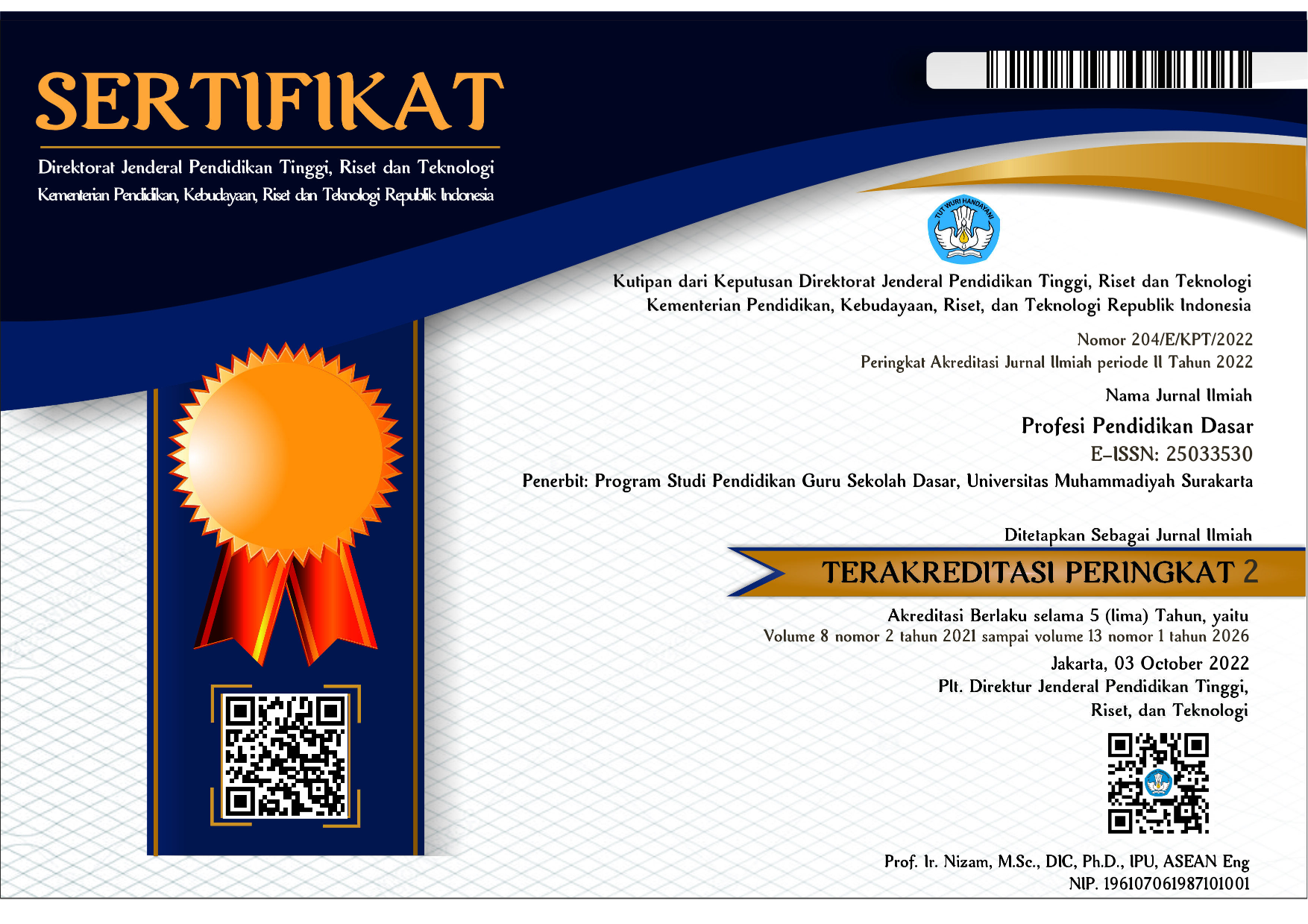Which Factor Influences Environmental Care Characters More: Knowledge of Issue or Demographic Factors?
Azmi Al Bahij(1), Nidar Yusuf(2), Lativa Qurrotaini(3), Khairadha Maharani(4*)(1) Universitas Muhammadiyah Jakarta, Jakarta
(2) Universitas Muhammadiyah Jakarta, Jakarta
(3) Universitas Muhammadiyah Jakarta, Jakarta
(4) Universitas Muhammadiyah Jakarta, Jakarta
(*) Corresponding Author
Abstract
The background of this research was due to the lack of people’s awareness to their environment. A report by Indonesian Central Statistics Agency in 2018 stated that the Indonesian Environmental Ignorance Behavior Index (IPKLH) in 2018 is 0.72. The number indicates a high level of ignorance on waste management. That being said, the character of environmental care in society is still low. Therefore, the researcher was moved to study the influence of knowledge issues and demographic factors on environmental care for elementary school students. A quantitative survey was utilized as a research methodology. In this study, 119 people were included as a sample. Of the questionnaire instrument for the character of environmental care, the researcher had adjusted to the life of elementary school students. The questionnaire instrument was then analyzed using SPSS version 22.0 with simple regression technique and multiple regression. The result showed that the significant value obtained by all variables is 0.001 or P < 0.05. That being said, Ha wa accepted, and Ho was rejected, or it displays that there was an influence between each of them. The percentage obtained respectely is 4.4% and 9.4%
Full Text:
PDFReferences
Aryogi, I., & Wulansari, D. (2016). Subjective Well-being Individu dalam Rumah Tangga Di Indonesia. Jurnal Ilmu Ekonomi Terapan, 1(1), 1–12. https://doi.org/10.20473/jiet.v1i1.1900
Azwar. 2006. Sikap Manusia, Teori dan Pengukurannya edisi ke-2. Yogyakarta : Pustaka Pelajar
Fua, J. La. (2014). Aktualisasi Pendidikan Islam Dalam Pengelolaan Lingkungan Hidup Menuju Kesalehan Ekologis. Jurnal Al-Ta’dib, 7(1), 19–36.
Harahap, R. Z. (2015). Etika Islam dalam Mengelola Lingkungan Hidup. EDUTECH: Jurnal Ilmu Pendidikan Dan Ilmu Sosial, 1(01).
Ifegbesan, A. P., & Rampedi, I. T. (2018). Understanding the role of socio-demographic and geographical location on pro-environmental behavior in Nigeria. Applied Environmental Education and Communication, 17(4), 335–351. https://doi.org/10.1080/1533015X.2017.1419102
Kaiser, F. G., Wölfing, S., & Fuhrer, U. (1999). ENVIRONMENTAL ATTITUDE AND ECOLOGICAL BEHAVIOUR. Journal of Environmental Psychology, 19(1), 1–19. https://doi.org/https://doi.org/10.1006/jevp.1998.0107
Liu, P., Teng, M., & Han, C. (2020). How does environmental knowledge translate into pro-environmental behaviors?: The mediating role of environmental attitudes and behavioral intentions. Science of The Total Environment, 728, 138126. https://doi.org/https://doi.org/10.1016/j.scitotenv.2020.138126
Narut, Y. F., & Nardi, M. (2019). Analisis Sikap Peduli Lingkungan Pada Siswa Kelas VI Sekolah Dasar di Kota Ruteng. Scholaria: Jurnal Pendidikan Dan Kebudayaan, 9(3), 259–266. https://doi.org/10.24246/j.js.2019.v9.i3.p259-266
Otto, S., Evans, G. W., Moon, M. J., & Kaiser, F. G. (2019). The development of children’s environmental attitude and behavior. Global Environmental Change, 58, 101947. https://doi.org/https://doi.org/10.1016/j.gloenvcha.2019.101947
Palupi, T., & Sawitri, D. R. (2017). Hubungan Antara Sikap Dengan Perilaku Pro-Lingkungan Ditinjau dari Perspektif Theory Of Planned Behavior Relationship Between Attitude And Pro-Environmental Behavior from the Perspective of Theory of Planned Behavior Perilaku Pro-Lingkungan. Proceeding Biology Education Conference, 14, 214–217.
Pronityastuti, M. (2017). The Effect of Gender Differences on Pro Environmental Behavior in Directorate General Binapenta&pkk, Ministry of Manpower, 2016. Jurnal Ilmiah Pendidikan Lingkungan Dan Pembangunan, 18(1), 21–27.
Purba, E. S., & Yunita, S. (2017). Kesadaran Masyarakat dalam Melestarikan Fungsi Lingkungan Hidup. Jupiis: Jurnal Pendidikan Ilmu-Ilmu Sosial, 9(1), 57. https://doi.org/10.24114/jupiis.v9i1.6461
Tucker, R., & Izadpanahi, P. (2017). Live green, think green: Sustainable school architecture and children’s environmental attitudes and behaviors. Journal of Environmental Psychology, 51, 209–216. https://doi.org/https://doi.org/10.1016/j.jenvp.2017.04.003
Molina, Vicente, M. A., Fernández-Sainz, A., & Izagirre-Olaizola, J. (2018). Does gender make a difference in pro-environmental behavior? The case of the Basque Country University students. Journal of Cleaner Production, 176, 89–98. https://doi.org/https://doi.org/10.1016/j.jclepro.2017.12.079
Wiryono, W. (2013). Pengantar Ilmu Lingkungan. Pertelon Media.
Article Metrics
Abstract view(s): 708 time(s)PDF: 494 time(s)
Refbacks
- There are currently no refbacks.


















